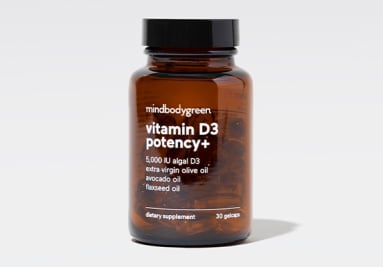Science Just Confirmed An Important Reason To Take Vitamin D After Pregnancy*



Ensuring your children get the nutrition they need for optimal health begins even before conception, which is why health experts often recommend that women pay extra attention to their nutrition as soon as they begin thinking about becoming a parent.
In addition to nourishing your body with wholesome foods, a few nutrients, in particular, should also be top-priority before, during, and after pregnancy because of the roles they play in mother and baby's health and well-being, as well as in baby's development.
While certain nutrients, such as folate, choline, and DHA, have been hailed as perinatal must-haves for a while now (and are probably already on the radars of new parents and parents-to-be), they're not the only big-hitters worth paying attention to during this important time in life. In fact, a recent research review further confirms that vitamin D is another nutrient to prioritize at this pivotal point.
The many roles of vitamin D in the body.
Vitamin D might be best known for helping maintain the proper balance of calcium in the body to support strong, healthy bones—but that's just one item on its long and impressive résumé.* The sunshine vitamin also works to support immune and gut health, promote a healthy thyroid, and help you maintain a balanced mood.*
It comes as no surprise, then, that vitamin D deficiency (which affects almost one-third of the population1), has been linked with everything from changes in mood and immunity to suboptimal bone health.*
During pregnancy, research has linked healthy vitamin D status in mothers with better maternal and infant outcomes2 related to bone density, immune function, fetal growth, and maternal metabolic health, to name a few,* according to integrative and functional medicine physician Alejandra Carrasco, M.D. And since the vitamin D needs of baby mean increased needs for mother, too, supplementation (specifically with vitamin D3) seems to be critical for both maternal and infant vitamin D sufficiency3.*
The latest research on vitamin D and breastfeeding.
Clearly, the significance of vitamin D during pregnancy is pretty well established—and now, new research confirms the importance of the sunshine vitamin (and supplementing with it) during lactation (or breastfeeding), too.
A recent scientific review published in Advances in Nutrition4 analyzed 19 clinical trials to determine the effect of maternal vitamin D supplementation on the mother's and infant's vitamin D status during lactation. What they found: Babies who were exclusively breastfed (which means they received no other form of nutrition or supplementation) had improved vitamin D status when their mother supplemented with the fat-soluble nutrient herself.*
"A [vitamin D-] deficient mom leads to a deficient baby," says Carol Wagner, M.D., co-author of the review and professor at the Medical University of South Carolina. Not only does deficiency affect bone development in the baby, but it is particularly critical for their developing immune system, as well, she notes.*
And though Wagner says that "there's been a reluctance by the medical professions to embrace maternal vitamin D supplementation during lactation," she hopes this review will be a step toward changing medical opinion about how infants' vitamin D status can be directly and easily supported.*
One particularly interesting takeaway from the research to date: Higher doses of vitamin D than traditionally utilized are most helpful in remedying vitamin D deficiency in lactating moms and breastfed infants, according to the researchers and collective science.* In fact, after evaluating the various trials in the review, the scientists and doctors concluded that a mother supplementing with more than 6,000 I.U. of vitamin D3 per day effectively corrected deficiency in both herself and her child.* To really drive home this takeaway, Wagner and the other researchers organized the outcomes of the studies they included in order to clearly demonstrate the incremental impact of higher doses of vitamin D.*
Commenting on this seminal research publication and the decades of work by Wagner and others, mbg's director of scientific affairs Ashley Jordan Ferira, Ph.D., RDN, concludes that, "This evidence-based need for vitamin D supplementation at 6,000 I.U.-plus per day demonstrated by the totality of clinical trial evidence is of paramount importance for women of childbearing age and pregnant women alike. And the need for this nutrient extends to us all actually. As a nation, our diets are wholly inadequate in vitamin D, and the case for a daily supplement at a clinically useful dose is incredibly clear."*
The takeaway.
This research clearly demonstrates the benefits of new mothers supporting their health (and their baby's!) by keeping a close eye on their vitamin D status and supplementing accordingly.* It's a win-win for both mother and child—and Wagner hopes this research will encourage more new parents to take their vitamin D levels into their own hands in order to promote a variety of areas of health throughout their breastfeeding journey.*

Josey Murray is a freelance writer focused on inclusive wellness, joyful movement, mental health, and the like. A graduate of Wellesley College, where she studied English and Creative Writing, her work appears in Women’s Health, Cook & Culture, and more. By expressing her own vulnerability, she writes with warmth and empathy to help readers find self-compassion and true wellness that’s sustainable for body, mind, and planet.

